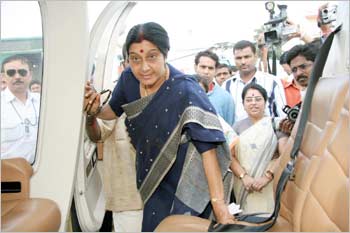
Through this he aims to look at India's growth from a rural perspective and question why the country's growth has not translated into development.
Professor Gupta opted for voluntary retirement recently from the Jawaharlal Nehru University.
"The academic world is not encouraging academic work!" he elaborates. "There is a lot of petty politics. If I had been younger I would have stuck it out. I felt I have a few good years left so let me now waste it. I am grateful to JNU for what it has done for me, but in the last few years a lot of pettiness has crept in the academic world. It will change, but I don't have the patience."
In the second part of his interview with Rediff.com's Sheela Bhatt, Professor Gupta discusses what he sees as the future of the Congress and BJP parties and breaks the myth about the youth brigade in Parliament.
Part I of the interview: 'The Congress needs the Gandhi family'
In the coming five years do you think India will see many changes under the Congress leadership?
I don't see many changes coming. I see them as trying here, trying there. But to have many changes there has to be a political will. I don't think they have it.
Why?
That takes too much work and energy. To be able to change the school system, the health system, the transport system these are most important... It needs too much energy.
I suppose Rahul Gandhi must have that energy.
Even if one man has enormous energy, he won't be able to do it. It is a big task to clear the entire system. Nandan Nilekani is good, but that's just the tip of the iceberg.
Of course, there are ways one can do it, but I don't see any sign so far.
A few months back it was said that Rahul Gandhi is a bachcha (child). But, now, it seems he is no longer looked upon as that. He has arrived.
That is true.
Do you see him becoming prime minister?
Oh, yeah! Of course, I do. I don't think that will happen within this term. This is Dr Manmohan Singh's term because he is healthy enough. If for some reason he falls sick, then Rahul Gandhi may come.
But I think Sonia Gandhi will hold him back for four or five years.
...
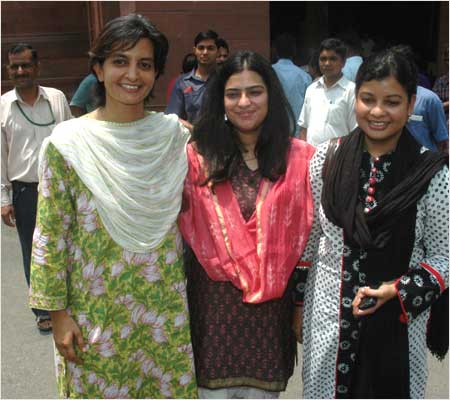
How do you see the lot of young parliamentarians?
People say there are lots of young parliamentarians today. This is strictly not true. Look at the statistics. There are more or the less from the same age group that was there earlier.
But what is negative about these new parliamentarians about whom we talk so much about is that they are not young at all -- they are two-four generations old!
The idea of putting young people in the party or as ministers is a bad thing because those who are the real party workers do not get a chance. The actual party workers are normally not noticed till they are 40, 45 because they are working up their career.
Here, people in their 20s and 30s are getting tickets and posts. I think this gives a bad impression. In the long term it is not a good thing.
If the Congress wants to recharge its batteries it has to now think of going beyond the symbolic young people image because in India there is no such thing as the 'demand of the youth.'
In majority parts of the country, the young and old have the same problems. They all want jobs, they all want to leave their village. The idea of putting 'young' as an image is very squeaky thing.
You and I get very impressed with this, we think, Buddhe buddhe chale gaye (the old have gone), the young have arrived.' But they are not young at all.
They are not people with ideas and imagination. They have inherited the mantle from their father or grandfather. If you admire only your father or grandfather, you are no good. You are not going to bring about change.
When you keep saying -- my father was so and so and my grandfather did this and that -- it means that you are not challenging or inquiring old ideas. When you are young your parent should be your first victim!
Coming back to the BJP, how do you see the mutinies by Arun Shourie and others that went on within the BJP?
In our country wherever there are equals, we can't function.
We are like a joint family where when the father dies the brothers quarrel and kill each other. What is going on in the BJP is similar.
The Congress survived because everybody is not equal in the party. In the BJP everybody is equal. It does not have a strong ideological base that the CPI-M (Communist Party of India-Marxist) has. They don't have a Politburo and such bodies that draws inspiration from the international Communist movement. That model of the Leftists is also ideologically supported.
The Leftists feel the Communist ideology will be forwarded if they follow what they term as 'democratic centralism.' It is a vanguard of their priorities.
The BJP party structure today is not part of their ideology. They have a flat party structure. Their ideology stems from the RSS (Rashtriya Swayamsevak Sangh).
Unless the BJP comes up with a stellar figure like Atal Bihari Vajpayee, these brothers will quarrel and the cousins will disintegrate.
This is the common trait of all Indian parties. Only those parties have survived which revolve around a person -- like Lalu Yadav and Mulayam Singh Yadav.
...
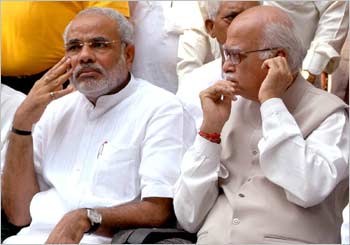
Any good things to say about L K Advani?
I have nothing good to say about Advani except for one thing that he is a man who operates ideology cynically. I don't think he believes in the BJP ideology.
He is very secular with a serious family life. His family life is modern, urban and secular. Vajpayee believed in it so he could use it to his advantage, but Advani is cynical about the BJP ideology.
After the general election, some people felt they voted for a corrupt Congress over a communal BJP. How do you see that mindset?
People don't talk about communalism in that sense. They see it in practice. When the Ram Sene guys beat up girls of a majority community, people took notice.
Look at the audience in most of these reality shows. When girls from small towns are singing, their parents are in the audience. They are clapping, encouraging them and blessing them. The Ram Sene attacked these kinds of girls and the parents didn't like it.
To be pro-Muslim or not is a different matter. But to wear jeans and go for shopping is normal and when you beat those girls they just don't like it.
One columnist wrote that this was the 'semi-final round' and Narendra Modi has been knocked out. Do you agree?
Some people are good at the regional level and some at the national level. He has done well at the regional level not because of the BJP, nor because of its ideology. What he has done is maintain Gujarat's position as the top economic state.
It was not he who put it at the top. The state has always been ahead. Modi didn't let it slip from its position. He inherited a functioning, economically prosperous state. Gujarat was at number three and is still there.
Narendra Modi has cleverly given Gujaratis the impression that the Centre is against Gujarat and he is fighting for Gujarat. He says we pay so much tax but what do we get back?
You might remember in the 1970s Jyoti Basu played the same card effectively. He said Bengal is undermined by the Centre.
For 10 years he did very well on that point. In Gujarat, Modi's winning card was that the 'Centre is not looking after us.' Outside Gujarat Modi was not a crowd puller. North Indians were not impressed as much as the Gujaratis.
Modi's identity as a Gujarati is very strong. He will remain in Gujarat. He will have a strong role to play within his party and will become the BJP's longest surviving chief minister.
I think the BJP and he himself has realised his limits. On a national scale you need to have a national presence. Vajpayee and Advani had it, but Modi is too much of a Gujarati.
Sushma Swaraj is a strong candidate, she is difficult to handle and is much tougher to fight than Modi because she is a woman. She is articulate and has an all-India image. Arun Jaitley does not have that image yet. He is still very much an organisation man.
If you are talking in terms of going out and fighting an election I think Sushma Swaraj is a better bet than Narendra Modi.
...
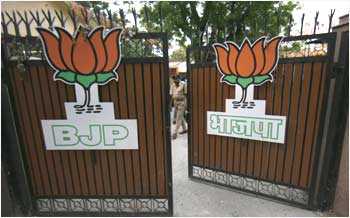
One of the big debates is whether the BJP should come closer to the centrist view or not. It's believed they will never win an election if they don't.
Or should the BJP stick to the right wing political ideology and maintain its distinct identity?
What's your view?
First, Indians don't know that ideology any more. Their whole idea of Pakistan, Partition and the Jaswant Singh fiasco doesn't attract young people. Go and see who are the people buying Jaswant Singh's books? Not a single young man.
People who have old memories and old grudges are talking about it. You remember when the Mumbai attacks happened what were the people of Mumbai saying? We don't want to talk about Pakistan, we want to talk about our own administrative lapses.
The BJP went there and could not capitalise upon the Mumbai attacks. People saw that the BJP is utilising it for the party's advantage.
The BJP has to move to the Centre but while doing so they have to be different than the Congress. The BJP's RSS ideology works fine for the Congress because it takes the BJP this far and no further.
Today, the time has come for the BJP to look back and think. It's not thinking yet. It is still being swayed by the RSS.
I have a very unhappy suspicion that out of this crisis the RSS may get an upper hand. The BJP will become a nuisance everywhere. They will vandalise.
The Bajrang Dal, Ram Sene, Vishwa Hindu Parishad -- these are people who have an allegiance to the RSS way of thinking.
The BJP will never be able to come out and condemn it and put them in jail.
The BJP will not be able to play a major role if they don't come to centrist politics. They are distancing the same middle class which supported them.
In the last election, the BJP for the first time lost in one ward of Malaviya Nagar (in Delhi). They had never lost here. These are the same people whose fathers voted for the BJP. They didn't vote for the BJP in this election.
Do you think a Vajpayee kind of leadership can find the middle ground?
They don't have it right now. I think Sushma Swaraj can do it.
Remember how she took an extreme position against Sonia Gandhi saying she will cut her hair etc...
People have short memories. They will forget.
...
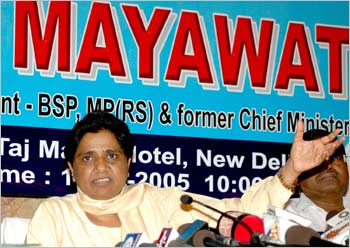
Why did Mayawati not fare well in the Lok Sabha election?
She didn't fail. She got more seats than the last time. Mayawati was not able to live up to the image she projected in 2007.
The 2007 image conveyed that 'I am anti-OBC. I am not asking for reservation. I want to stick to poor people regardless of the caste background.'
This time she didn't do the same thing. She played all angles and in the process lost her distinctive character.
Anyone who is advising Mayawati should tell her to return to the 2007 image. She should return to the anti-OBC plank, make a mockery of reservation. She should try and help the scheduled castes and poor OBCs to give them a chance for upward mobility.
At the national level she has lot it. She changed her stance vis-a-vis the OBCs and lost it. Her programme against the elite of anti-OBCs could have worked very well at the national level. She lost her own plank.
Talking about India's growth and future, how do you look at India's advantages and disadvantages?
India would like to consolidate its advantages, but India doesn't know where its advantages lie objectively. Subjectively, they think it lies in the IT sector, finance and such fields.
In the developing world, India's main advantage since the last 30 years was its intellectual advantage. It is losing there.
Look, at the listing for the universities. We don't even figure in the first 100. Can you imagine that?
China's Fudan University is at number 70. Have you heard of it? I had never heard of it. Look at the citation index. Our people are never quoted. Gradually, other people are taking over.
R&D funding is going down in real terms. If you talk about enhancing human capital India is not working in a planned manner.
We are making money only because we sell cheap white collar or cheap blue collar labour. (Former Nasscom president) Kiran Karnik said that Indian IT companies charge around 40 per cent less, so people come to us.
India should think how to raise its brain power and how to increase skilled labour. The skill of the working class has not gone up since years. The organised industries's workers are still around 22 million only. The private sector is around another 8 million.
Ninety-three per cent of India's work force is in the unorganised sector. The real point is this: You have to make the poor of India net consumers.
That will only happen when you make them full citizens and they are able to access public goods at quality levels in the health and education sector.
I am telling you India will change then.